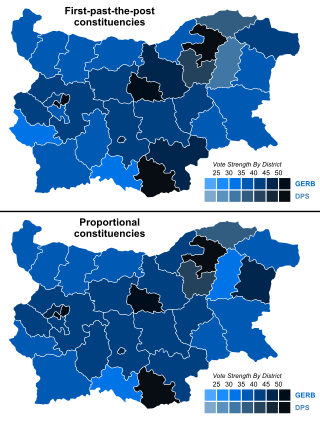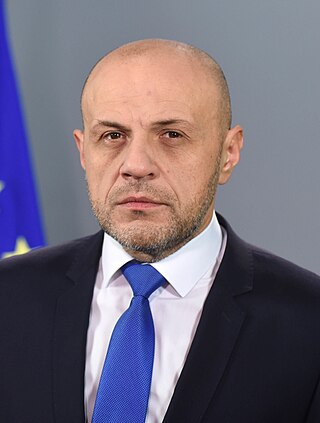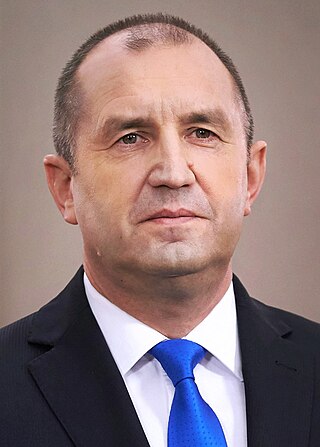
The politics of Bulgaria take place in a framework of a parliamentary representative democratic republic, whereby the prime minister is the head of government, and of a multi-party system. Executive power is exercised by the government. Legislative power is vested in both the government and the National Assembly. The Judiciary is independent of the executive and the legislature.

Georgi Sedefchov Parvanov is a Bulgarian historian and politician who was President of Bulgaria from 2002 to 2012. He was elected after defeating incumbent Petar Stoyanov in the second round of the November 2001 presidential election. He took office on 22 January 2002. He was reelected in a landslide victory in 2006, becoming the first Bulgarian president to serve two terms. Parvanov supported Bulgaria's entry into NATO and the European Union.

The National Movement for Stability and Progress is a liberal, populist political party in Bulgaria. It was known as the National Movement Simeon II until 3 June 2007.

The Bulgarian Socialist Party (BSP), also known as The Centenarian, is a centre-left, social democratic political party in Bulgaria. The BSP is a member of the Socialist International, Party of European Socialists, and Progressive Alliance. Although founded in 1990 in its modern form, it traces its political heritage back to the founding of the BRSDP in 1891. It is also Bulgaria's largest party by membership numbers.

The Movement for Rights and Freedoms is a centrist political party in Bulgaria with a support base among ethnic minority communities. It was a member of the Liberal International and the Alliance of Liberals and Democrats for Europe (ALDE). While representing the interests of Muslims, especially Turks and to a lesser extent Pomaks, the party also receives the largest share of Romani votes.

Parliamentary elections were held in Norway on 11 and 12 September 2005. The result was a victory for the opposition centre-left Red-Green Coalition, which received 48.0% of the votes and won 87 out of 169 seats, dominated by the Labour Party's 61 seats. The three-party centre-right government coalition won 44 seats and the right wing Progress Party won 38, becoming the largest opposition party. Voter turnout was 77.1%, an increase of 2 percentage points compared to the 2001 elections.

Sergey Dmitrievich Stanishev is a Bulgarian politician who served Prime Minister of Bulgaria from 2005 to 2009. A member of the Socialist Party, which he led from 2001 to 2014, he later served as Member of the European Parliament from 2014 to 2024. Stanishev was also the President of the European Socialists from 2011 to 2022 and a Member of the National Assembly from 1997 to 2005 and from 2009 to 2014.
The history of Bulgaria from 1990 to the present is the period of Bulgarian history that begins after the fall of Communism and the transition to a market economy.

The eighty-ninth cabinet of Bulgaria, also known as the Three-party coalition cabinet and the Stanishev Government, ruled from August 17, 2005, to July 27, 2009. The cabinet was formed with the coalition of the three leading at that time: BSP, NDSV and DPS, in order of their parliamentary representation. Their parliamentary representation also determined the number of cabinet appointments.

Parliamentary elections were held in Bulgaria on 5 July 2009. With 40% of the vote, the decisive winner of the elections was the established in 2006 personalistic party of Boyko Borisov, GERB. The Socialist Party, in power before the election, was in second place, with around 18%. Оnce-ruling National Movement Simeon II did not cross the 4% threshold and won no seats. The turnout was 60.6%, one of the lowest ever. Following the election, GERB leader Boyko Borisov became prime minister. Just like all the previous parliamentary elections since the fall of communism, the government was not re-elected.

Parliamentary elections were held in Bulgaria on 12 May 2013, two months ahead of schedule. Protests had forced the resignation of the GERB government in February, leading to the election being moved up.

An election of the Members of the European Parliament from Bulgaria to the European Parliament was held on 25 May 2014 as part of the larger European Parliament election. After a decision by the European Council in 2013, Bulgaria was allocated 17 seats in the European Parliament for the Eighth European Parliament.

Plamen Vasilev Oresharski is a Bulgarian politician who served as Prime Minister of Bulgaria from 2013 to 2016. Affiliated with the Bulgarian Socialist Party, he previously served as Member of the National Assembly from 2009 to 2013, Minister of Finance from 2005 to 2009 and Deputy Minister of Finance from 1997 to 2001.

Mihail Raykov Mikov is a Bulgarian politician who was Chairman of the Bulgarian Socialist Party (BSP) from 2014 to 2016. He is a parliamentarian with six consecutive terms as a deputy in the National Assembly. His career in the legislature culminated in his election as Chairman of the 42nd National Assembly on May 21, 2013. Mikov was Minister of Interior from 24 April 2008 to 29 July 2009 in Sergei Stanishev's government. Currently he is the leader of the Parliamentary Group of BSP Left Bulgaria in the 43rd National Assembly, the coalition led by the socialist party. Mihail Mikov was elected as Chairman of the BSP on 27 July 2014, succeeding Sergei Stanishev. He won a run-off against outgoing Economy and Energy Minister Dragomir Stoynev with a final tally of 377-333.

The eighty-eighth cabinet of Bulgaria, also known as the Sakskoburggotski Government and informally as the Tsar's cabinet, ruled from July 24, 2001 to August 17, 2005. Although the National Movement Simeon II won half the National Assembly seats in the 2001 parliamentary election, and therefore could have probably governed alone, a cabinet was formed as a coalition between the winners and the Movement for Rights and Freedoms. Although not in a coalition with the Tsar's party, the Bulgarian Socialist Party held two cabinet posts as well. Their members sat as independents.

Parliamentary elections were held in Bulgaria on 5 October 2014 to elect the 43rd National Assembly. GERB remained the largest party, winning 84 of the 240 seats with around a third of the vote. A total of eight parties won seats, the first time since the beginning of democratic elections in 1990 that more than seven parties entered parliament. Boyko Borisov then became prime minister as head of a coalition with the Reformist Bloc and with outside support from the Patriotic Front and the Alternative for Bulgarian Revival.

Parliamentary elections were held in Bulgaria on 4 April 2021 at the end of the term of the National Assembly elected in 2017. Parties in the governing coalition led by Boyko Borisov lost seats and no party leader was able to form a coalition government within the time limit. This triggered the July 2021 Bulgarian parliamentary election.

General elections were held in Bulgaria on 14 November 2021 to elect both the President and the National Assembly. They were the country's third parliamentary elections in 2021, with no party able to form a government after the elections in April and July. A second round of the presidential elections were held on 21 November 2021 as no candidate was able to receive a majority of the vote in the first round.

Early parliamentary elections were held in Bulgaria on 2 October 2022 to elect members of the 48th National Assembly. The snap election was called after the fall of the Petkov Government, a four-party coalition, in June 2022. This was the fourth parliamentary election since 2021, an unprecedented situation in Bulgarian history, the previous elections being the April, July, and November 2021 elections.

The Bulgarian political crisis is a period of instability in Bulgaria, which has seen the country face seven parliamentary elections over four years: April 2021, July 2021, November 2021, October 2022, April 2023, June 2024 and October 2024.



















